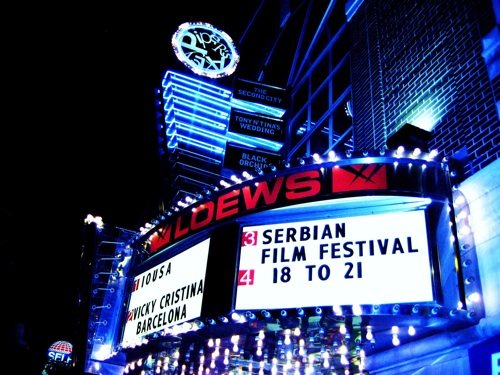 Cinephiles of the world rejoice! The second annual Serbian Film Festival kicks off this week in Chicago, featuring fifteen features, shorts, and documentaries from legendary and up-and-coming Serbian talent. Over the last two decades, Serbia has built a name for itself in world cinema, proving to be a fertile and fearless region for uncompromising and guerilla filmmaking.
Cinephiles of the world rejoice! The second annual Serbian Film Festival kicks off this week in Chicago, featuring fifteen features, shorts, and documentaries from legendary and up-and-coming Serbian talent. Over the last two decades, Serbia has built a name for itself in world cinema, proving to be a fertile and fearless region for uncompromising and guerilla filmmaking.
Festival co-founder and proud Serb Slavko Gajic is also the president of Euro-American Spirit, a non-profit that promotes European culture through film festivals. Gajic says, “Chicago is one of the largest Serbian cities in the world, and we wanted to present films to the built-in Serbian audience in Chicago, but also to expose to the public, who might not have a chance to see them, what Serbian films are all about.”
The opening night ceremonies begin Thursday, Sept. 18 and run through Sunday, Sept. 21 at Loews Pipers Alley, 1608 N. Wells, with $60 passes allowing access to all films.
“Because of the history and the culture of Serbia, it’s a fearless kind of filmmaking,” says Gajic. “The films can be very dark, but they can also poke fun at topics such as war, hate, and death. There is always some element of celebration, what I like to refer to as a ‘euphoric delirium’ within the films. … It is ultimately a cathartic experience.”
“Serbian film is fearless; there is no realm that is off limits, and even if it makes the culture look bad…it’s not afraid. That is the ultimate achievement of the films and is the gift it presents to world cinema.”
The event is grassroots, with the ticket price going to finance the Pipers Alley rental fees. This year, the intrepid Gajic was able to bring in guest director Zelimir Zilnik, whose films Kenedi is Getting Married and That’s How Steel Was Hardened serve as the opening-night presentations. Kenedi tells the story of a Romani gypsy who is kicked out of Kosovo by Albanians and in order to survive becomes a gigolo whose main source of income is older women.
“There are all sorts of political problems with Kosovo declaring independence unilaterally, which means it’s not recognized by Serbia and 140 countries around the world, so it’s in political limbo at the moment,” says Gajic. “Film is a kind of escapism, and a way for us to know that we’re still producing something culturally. It’s very typical that in times of political crises and oppression, some of the best culture emerges. Serbs have had severe political problems the last two decades, but culturally, we are thriving.”
-Drew Fortune
Serbian Film Festival: www.serbianfilmfestival.com
